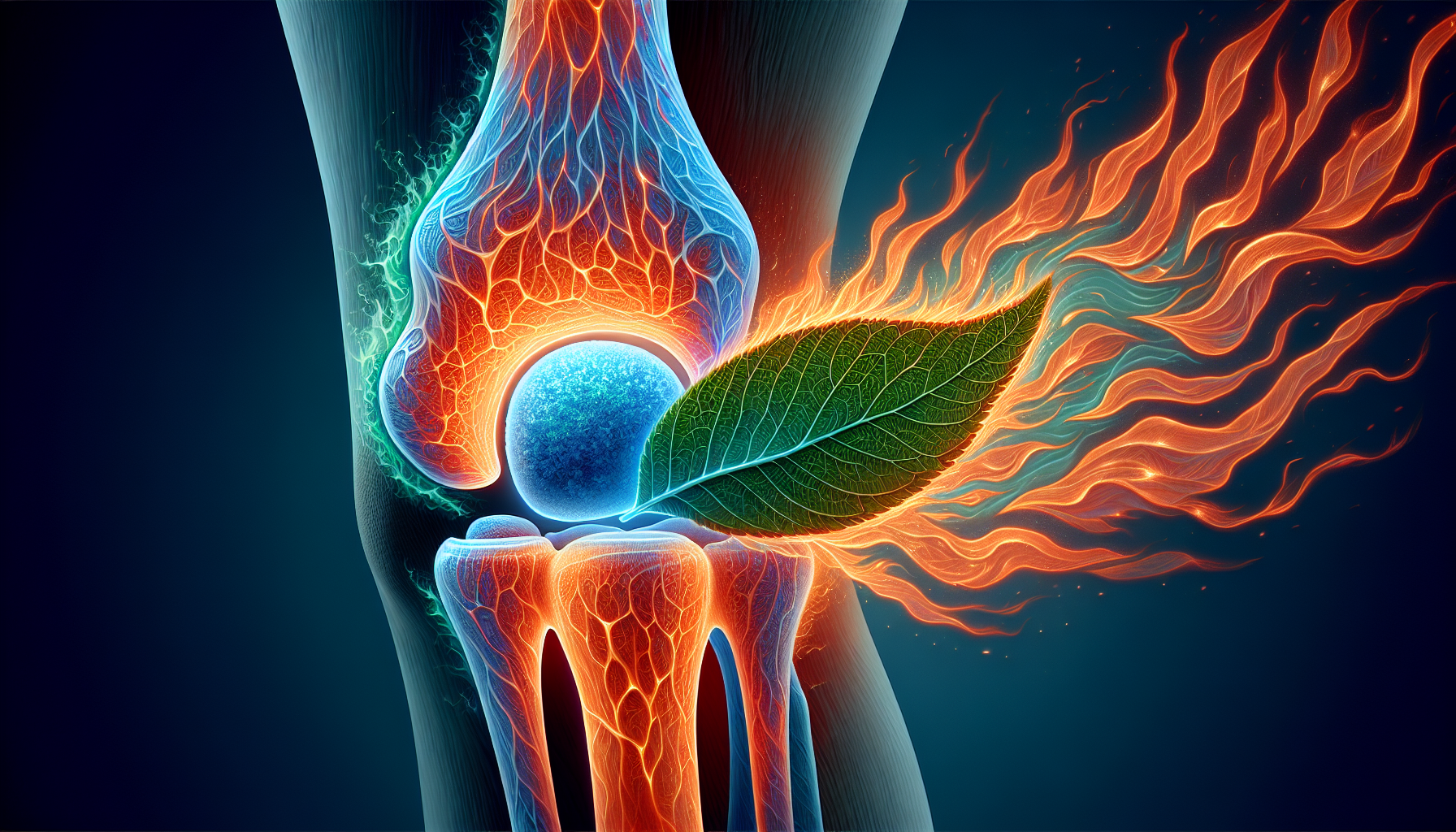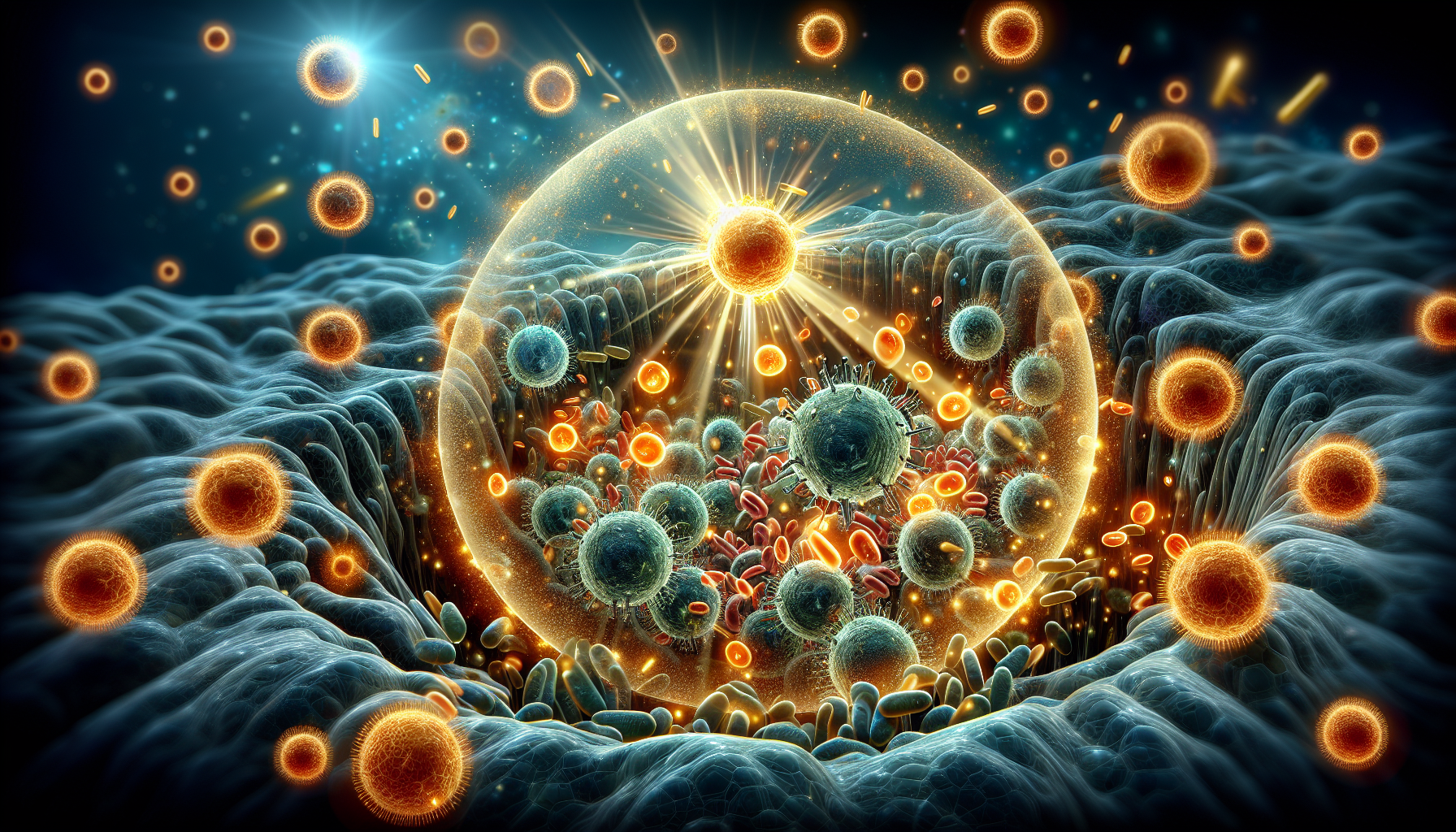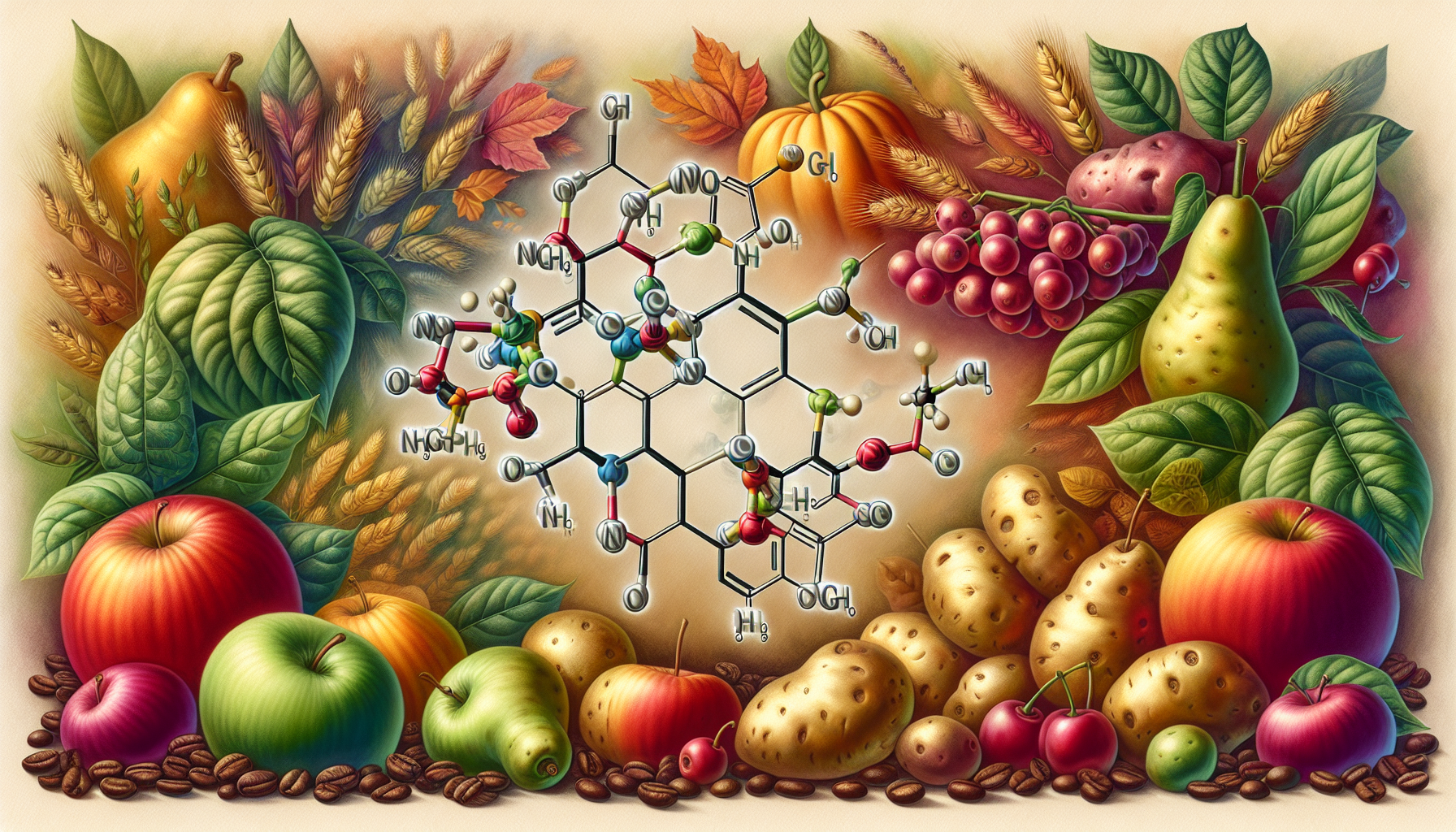Top Benefits of Quercetin: Enhance Your Health Today
Quercetin is renowned for its potent antioxidant properties and its capacity to offer multiple health benefits.. It can boost your immune system, reduce inflammation, and even protect your heart. Found in many fruits and vegetables, quercetin may also help manage allergies and enhance overall well-being. Dive into this article to learn more about the health benefits of quercetin here.
Key Takeaways
Quercetin, found in foods like onions, grapes, and broccoli, is a potent antioxidant that helps protect cells from free radical damage, potentially reducing the risk of heart disease and other age-related conditions.
Quercetin has significant anti-inflammatory properties, which can alleviate symptoms of conditions like arthritis and provide cardiovascular benefits by lowering blood pressure and preventing plaque build-up in arteries.
Quercetin shows promise in offering various health benefits, including potential cancer-fighting properties, neuroprotective effects that may reduce the risk of neurodegenerative diseases, and aiding in diabetes management and immune function enhancement.
What is Quercetin?
In the realm of health and nutrition, we frequently search for effective ways to combat aging and environmental stressors. Quercetin, a natural plant pigment, not only imparts vibrant colors to a variety of fruits and vegetables but also offers a multitude of health benefits. It is predominantly located in the outer layers of:
onions
grapes
berries
cherries
broccoli
citrus fruits
Quercetin serves as a natural protective agent, showcasing the efficiency of natural design.
The most notable feature of quercetin is its strong antioxidant properties. By neutralizing free radicals—unstable molecules that can damage cells—quercetin helps protect against oxidative stress. This protective action against free radicals not only reduces the risk of heart disease but also helps prevent various age-related diseases influenced by cellular damage.
Dietary flavonoids like quercetin play a crucial role in combating free radicals produced by pollution, oxidative stress, and poor diets. By including quercetin-rich foods in our diet, we leverage these natural compounds to help our bodies maintain balance and resilience. As we delve deeper, we will uncover the extensive health benefits quercetin offers for overall health and longevity.
Quercetin and Its Antioxidant Properties
Think of antioxidant science as an epic battle where free radicals are the villains, and quercetin is the hero fighting oxidative stress. As we age, our bodies produce more of these free radicals and harmful molecules, leading to cellular damage and chronic diseases. Quercetin steps in with its antioxidant abilities, neutralizing these harmful agents and protecting our cells from oxidative damage. It's important to note that quercetin also has antioxidant and anti inflammatory properties.
Imagine a barrier that not only defends against free radicals but also reduces inflammation and lowers heart disease risks. Research shows that quercetin offers these benefits, promoting overall health stability. Cardiologists emphasize its role in cardiovascular health, ensuring smooth blood circulation and robust heart function.
The beauty of quercetin lies in its potency and accessibility through common dietary sources. Foods like dark grapes and broccoli provide ample amounts of this beneficial flavonoid. By incorporating these colorful, nutrient-rich foods into our diet, we can enjoy the wide-ranging benefits of quercetin, strengthening our body's defenses against aging and environmental challenges.
Anti-Inflammatory Effects of Quercetin
Inflammation is a ubiquitous antagonist that can precipitate a plethora of health complications, encompassing the initiation of arthritis and cardiovascular disease. Amid this perpetual struggle for health preservation, quercetin surfaces as a potent confederate. It efficaciously obstructs enzymes instigating inflammation and targets inflammatory factors within our physiological systems. Through its mechanisms, quercetin ameliorates the repercussions of chronic inflammation.
The underlying mechanisms of quercetin’s anti-inflammatory properties are indeed remarkable. This naturally occurring compound mitigates cytokine production—principal contributors to exacerbating inflammation—which could potentially support conditions such as rheumatoid arthritis. It specifically impedes adenosine deaminase activity within joint tissue, underscoring its efficacy in local discomfort and edema alleviation. As a result, individuals experience diminished manifestations of chronic inflammation alongside enhanced levels of physical comfort.
Quercetin aligns seamlessly with our body’s intrinsic processes to delicately yet assertively achieve equilibrium when ingested either through dietary supplements or foods rich in this potent compound. We fortify ourselves against the insidious inflammations threatening our healthful existence—discovering additional benefits associated with their use further solidifies the effect of quercetin’s indispensable role in conjunction with other essential nutrients vital to ensuring optimal wellness.
Cardiovascular Health Benefits
The heart, a vital organ, necessitates meticulous care for its optimal function. Quercetin, a naturally occurring flavonoid, has emerged as a key factor in promoting circulatory health. Research has shown its effectiveness in improving high blood pressure, especially in those with hypertension, presenting a viable option for improving cardiovascular health.
Beyond the regulation of blood pressure, quercetin exhibits additional cardiovascular benefits. It has been observed to augment the functionality of endothelial cells, which constitute the innermost lining of our arteries, thereby facilitating optimal systemic circulation. By inhibiting the accumulation of arterial plaque, the effect of quercetin further demonstrates its efficacy in mitigating the risk of atherosclerosis, a predominant factor in cardiovascular disease. Thus, it serves as a protective agent against progressive obstructions that could precipitate severe medical emergencies.
The role of quercetin in cardiovascular preservation is multifaceted, encompassing both preventative strategies and defensive mechanisms. It has been observed to attenuate the oxidative damage inflicted by low-density lipoprotein cholesterol (LDL), colloquially referred to as the “bad” cholesterol. This defensive mechanism shields cardiac function from the deleterious effects associated with this type of lipid imbalance. As we strive for lives imbued with health and vitality, the integration of quercetin, either through dietary intake or supplementation, may constitute a cornerstone practice within our heart-health regimens, perpetuating resilience and endurance at the epicenter of circulation. This underscores the potential of quercetin supplementation as a vital component in the pursuit of optimal cardiovascular health.
Potential Cancer-Fighting Properties
In the ongoing quest for effective cancer treatments, researchers are increasingly focusing on quercetin, a flavonoid with potential anti-cancer properties. Quercetin’s ability to induce apoptosis, a form of programmed cell death, and inhibit cell division, suggests its potential as a powerful tool in curbing the proliferation of cancerous cells.
Quercetin’s capacity to trigger apoptosis has been documented across a variety of cancer types, including breast, lung, prostate, and colon cancers. Importantly, quercetin’s ability to selectively target malignant cancer cells, while sparing healthy ones, positions it as a potentially valuable component in the development of anti-cancer strategies.
Despite the promising prospects and encouraging results from in vitro and animal studies involving quercetin, it is crucial to proceed with caution. Clinical trials involving human subjects are essential for the widespread incorporation of quercetin into therapeutic practices against cancer.
In the development of new medications, challenges such as solubility issues that limit therapeutic effectiveness are common, and quercetin-based solutions are not exempt from these problems. Research has led to the exploration of advanced delivery methods, such as nanoparticle-based systems, to enhance the bioavailability of these compounds. As research continues to evaluate their effectiveness, there is significant optimism for a deeper understanding of their potential role in future strategies to combat malignancies. With safety confirmation through rigorous testing and randomized clinical trials, quercetin is poised to make a substantial contribution to global efforts aimed at tackling one of today’s most formidable health challenges.
Neuroprotective Effects and Cognitive Function
In the intricate domain of neurology, the neuroprotective attributes of quercetin have emerged as a pivotal element in the preservation of cognitive function. This flavonoid’s ability to counteract oxidative stress and inflammation provides a protective milieu for neurons, potentially attenuating the risk of neurodegenerative disorders such as Alzheimer’s and Parkinson’s diseases.
The lipophilic nature of quercetin facilitates its passage across the blood-brain barrier, enabling it to function as a neuroprotective agent. Its influence on cognitive function is not merely speculative; empirical evidence from animal models suggests that quercetin enhances memory and learning capabilities, providing an insight into its potential role in combating age-related cognitive decline. By inhibiting neuroinflammatory processes and downregulating the production of detrimental cytokines, quercetin plays a protective role against the deterioration of the brain, our most critical organ.
The narrative of quercetin’s neuroprotective properties is one of potential and optimism. With continued research and clinical trials, we may eventually harness its full potential to safeguard cognitive function and mitigate the effects of neurodegeneration. Until such time, the knowledge that dietary sources rich in quercetin, such as coffee, may contribute to neurological health provides some comfort. This underscores the importance of further research into the role of quercetin in neurology, with the aim of fully elucidating its mechanisms and therapeutic potential in neurological disorders.
Managing Diabetes with Quercetin
In the face of the escalating diabetes epidemic, quercetin has emerged as a promising candidate for its management. It has demonstrated potential in attenuating postprandial hyperglycemia by inhibiting alpha-glucosidase activity, which is beneficial for individuals with type 2 diabetes. Treatment with quercetin may aid in maintaining optimal blood glucose levels by enhancing cellular glucose uptake and modulating key signaling pathways.
The resemblance of quercetin to metformin, a well-established antidiabetic medication, is noteworthy. Both in- vitro studies and in vivo studies indicate that quercetin exhibits actions similar to metformin, suggesting a potential natural alternative to conventional treatment modalities. Population research correlating a high intake of quercetin with reduced rates of type 2 diabetes substantiates its value as a dietary approach to manage this widespread condition.
The potential of quercetin extends beyond mere glycemic control. It also demonstrates therapeutic benefits in mitigating diabetic nephropathy, thereby reinforcing its multifaceted role against various complications associated with diabetes. The exploration into the benefits of this polyphenol continues, with the aim of substantiating its merit within regimes aimed at managing diabetes through naturally derived solutions.
Quercetin for Allergy Relief
Individuals afflicted with allergies may find a natural adjunct in quercetin. This compound functions as an antihistamine and has the potential to suppress the release of histamine and various inflammatory mediators, thereby alleviating the persistent discomfort associated with allergic reactions. The ability of quercetin to strengthen mast cell membranes and reduce IgE antibody secretion underscores its potential efficacy as a naturally derived remedy for those burdened by allergy symptoms.
Scientific evidence supports the anecdotal claims of quercetin’s benefits in alleviating allergy symptoms. Research has demonstrated its properties that can aid in relieving respiratory allergies such as upper respiratory tract infections by inhibiting eosinophil peroxidase functions and preventing the migration of inflammatory cells into lung tissue, providing significant relief for sufferers. Animal studies suggest that supplementation with quercetin might attenuate severe allergic reactions such as peanut-induced anaphylaxis, indicating broader implications for managing various allergenic conditions.
The journey towards alleviating allergies via quercetin should involve meticulous consideration and expert consultation. Despite evidence indicating its therapeutic potential, safety remains a top priority when considering the incorporation of this compound into a health regimen. Patients with allergies require guidance, and seeking advice from a healthcare professional is essential. As our understanding of this versatile group deepens, we may begin to appreciate even more its value. The goal is to enhance wellness while providing comfort, especially in the context of advancing competitive measures.
Enhancing Immune Function
In the ongoing struggle against infectious agents, quercetin has emerged as a potent natural enhancer of our immune systems. It boasts a spectrum of anti-pathogen capabilities and has demonstrated efficacy in in vitro studies combating various viruses, including herpes simplex virus type 1. This positions it as a formidable candidate for both the prevention and treatment of viral diseases. Quercetin fine-tunes immunity by modulating immune cell homeostasis and inhibiting IgE antibody production, leading to robust yet balanced protective responses. The significant advantages of incorporating quercetin include:
Augmenting the body’s immunological response to viral threats
Functioning as an antiviral barrier against multiple pathogens
Modulating immune activity to prevent excessive inflammation
Enhancing the innate mechanisms that protect us from infections
Given its substantial antiviral capabilities and its ability to stimulate immunity, the integration of quercetin into one’s health regimen can be highly beneficial.
At a more granular level within cells, quercetin intervenes by targeting enzymes and influencing critical pathways integral to immune regulation. Its ability to inhibit NF-kB activation—a key regulator in controlling immune responses—and suppress p38 mitogen-induced kinase activity ensures that defenses are not only vigorous but also appropriately regulated.
Clinical investigations lend support to claims regarding quercetin’s positive impact on immune health—especially when combined with supplements like vitamin C—with few adverse effects noted in human studies to date. This underscores its potential utility among dietary supplements aimed at bolstering our biological defenses. As we deepen our understanding of how to best equip ourselves against mutating pathogens, research indicates that quercetin may play a pivotal role in aiding us in developing stronger resistance against illnesses caused by these microscopic adversaries.
Bioavailability of Quercetin
The efficacy of any compound is significantly influenced by its bioavailability, and bioavailability of quercetin is no exception. Bioavailability refers to the proportion of a substance that enters the bloodstream upon introduction to the body, thereby becoming available for utilization or storage. The health benefits derived from quercetin are dependent on the efficiency with which our bodies can absorb and utilize this compound.
Central to the concerns regarding the effects of quercetin’s bioavailability is its predominant form in plants—primarily as hydrophilic glycosides—which hinders direct absorption into our system. A more readily absorbable variant, known as quercetin aglycone, circumvents these challenges posed by glycoside forms, thereby amplifying its beneficial effects.
Advancements in scientific research and technological development have led to improved methods for enhancing the bioactivity of substances like quercetin. Innovations such as nanotechnology and liposomal encapsulation have emerged at the forefront of these advancements. These techniques address obstacles related to absorption, providing us with enhanced access to the potential health benefits associated with the consumption of fruits and vegetables rich in quercetin.
With a focused intent on maximizing the benefits derived from dietary intake, particularly concerning dietary flavonoids like quercetin, understanding and leveraging these exciting developments allow individuals seeking wellness advantages to benefit from leading-edge endeavors designed to tap into the intrinsic properties of these compounds, which are capable of exerting a far-reaching influence on human well-being.
Quercetin Supplementation: Dosage and Safety
The subject of quercetin supplementation necessitates careful consideration, encompassing a comprehensive understanding of suggested dosages, potential adverse effects, and safety concerns. Quercetin supplements, typically administered at daily doses ranging from 250 to 1000 milligrams for periods not exceeding 12 weeks, have become a fundamental component of many individuals’ wellness regimens. It is important to acknowledge that the use of any form of quercetin supplement may result in side effects such as headaches, gastrointestinal disturbances, and sensations like tingling in the extremities.
Despite the attractive health benefits associated with the quercetin supplement, certain demographics should exercise particular caution. Pregnant or lactating women are advised to refrain from taking these supplements, with dietary sources considered safe during these periods. Similarly, individuals suffering from kidney disorders should exercise caution due to the potential exacerbation posed by supplemental quercetin treatment.
Interactions with Medicines
Quercetin, a potent flavonoid, may interact with certain prescribed medications and treatments due to its significant effects. These potential interactions include:
Anticoagulants: Quercetin may potentiate the effect of anticoagulants thereby increasing the risk for bleeding.
Chemotherapeutic agents: In vitro and in vivo studies suggest that quercetin may potentiate the effects of doxorubicin and cisplatin, two chemotherapeutic medications used in cancer treatment.
Corticosteroids: Quercetin may interact with corticosteroids, potentially affecting their pharmacokinetics or pharmacodynamics.
Hepatically metabolized drugs: Quercetin may augment the effects and side effects of drugs metabolized in the liver by inhibiting hepatic metabolic processes.
Quinolone antibiotics: Quercetin may attenuate the efficacy of quinolone antibiotics, also known as fluoroquinolones.
Other drugs: Quercetin may inhibit the actions of membrane transport proteins responsible for the uptake of a number of different drugs potentially increasing their absorption and the risk of side effects.
Furthermore, quercetin can modulate the absorption, distribution, metabolism, and clearance of some drugs in vivo, thereby affecting their pharmacokinetic profile. It is imperative to consult with a healthcare professional before initiating any new dietary supplement regimen, especially if concurrently taking other medications. They can provide guidance based on the individual’s specific health situation and medication regimen. This information is not exhaustive, and other interactions may exist. Further research is warranted to fully elucidate the potential drug interactions of quercetin.
Quercetin-Rich Foods
Individuals seeking to enhance their dietary intake with natural sources of quercetin have a variety of nutritious and palatable options available. These include:
Apples, which not only contribute to daily well-being but also serve as a significant source of quercetin, offering both pleasing crunch and sweetness.
Red grapes, which provide a juicy richness and are a valuable source of this beneficial compound.
Citrus fruits, which provide tangy flavor bursts along with valuable flavonoids for everyday nutrition.
Venturing into the array of foods rich in quercetin, one can discover the vibrant hues found in dark berries like blueberries, blackberries, and bilberries—all teeming with this advantageous compound. Vegetables such as onions and broccoli, or herbs such as parsley and sage, add layers of complexity to dishes while offering substantial amounts of quercetin. Incorporating these ingredients into regular meals ensures consistent intake of these benefits.
Moreover, familiar kitchen staples also provide enjoyable means for consuming quercetin. Savoring a cup of tea, enjoying a glass of red wine, or using olive oil in cooking transcends mere culinary practice. It presents an opportunity to access the antioxidative properties inherent to quercetin. By embracing diets rich in naturally occurring elements, one can sustain continuous intake promoting both protection against illness and enhanced overall wellness.
Summary
As we reach the end of our journey through the world of quercetin, it’s clear that this flavonoid stands as a paragon of health promotion. From its antioxidant prowess to its potential role in cancer prevention, cardiovascular health, and immune function, quercetin has demonstrated a remarkable capacity to enhance our wellbeing. Its anti-inflammatory and neuroprotective properties further solidify its status as a valuable nutrient in the pursuit of vitality.
While the allure of quercetin’s potential health benefits is undeniable, it is crucial to approach its supplementation with informed caution. Considering the dosage and safety concerns, particularly the interactions with medications and the special considerations for pregnant women and those with kidney problems, is essential for harnessing quercetin’s full potential. Consulting with healthcare professionals ensures that we can enjoy the benefits of quercetin without undue risk.
In conclusion, the effect of quercetin offers a compelling narrative of nature’s power to nurture and protect. By incorporating quercetin-rich foods into our diets and considering supplementation where appropriate, we can take proactive steps toward a healthier, more resilient future. Let the story and effects of quercetin inspire you to embrace the natural solutions that surround us and enhance your health today.
Frequently Asked Questions
Can quercetin supplements replace medications for conditions like high blood pressure or diabetes?
It is not advisable to substitute medications for high blood pressure or similar conditions with quercetin supplements. Before adding quercetin to your regimen as an adjunct method, it’s essential to seek guidance from a healthcare professional.
Are there any risks associated with consuming quercetin-rich foods?
Individuals should seek the advice of a healthcare professional before incorporating quercetin-rich foods into their diet, especially if they have particular health conditions or allergies, although these foods are typically considered safe for consumption.
How does quercetin improve cardiovascular health?
By enhancing endothelial function, diminishing blood pressure, and preventing the accumulation of plaque within arteries, Quercetin bolsters cardiovascular health, which consequently decreases the likelihood of heart disease.
Is quercetin safe for pregnant or breastfeeding women?
Pregnant and breastfeeding women should steer clear of taking quercetin supplements, because the safety of taking high doses during these periods is not established, though it’s considered safe to ingest quercetin when found in foods.
Can quercetin interact with other medications?
It’s essential to seek the guidance of a healthcare professional before you begin taking quercetin, especially if you’re currently on other medications. This is due to potential interactions between quercetin and certain drugs.
Always seek medical advice before initiating any regime of quercetin supplementation.
Disclaimer
The information provided in this article is for educational and informational purposes only and is not intended as medical advice. While we strive to provide accurate and up-to-date information, we make no representations or warranties of any kind, express or implied, about the completeness, accuracy, reliability, suitability, or availability with respect to the content. The information contained herein should not be used as a substitute for the advice of an appropriately qualified and licensed physician or other healthcare provider. The suggestions and insights should not be used for diagnosing or treating a health problem or disease, or prescribing any medication. It is always best to seek the advice of your qualified healthcare provider with any questions you may have regarding a medical condition or treatment and before considering supplementation. Never disregard professional medical advice or delay in seeking it because of something you have read on this site.
Additional Reading
Additional Resources
References
Atta A, Salem MM, El-Said KS, Mohamed TM. Mechanistic role of quercetin as inhibitor for adenosine deaminase enzyme in rheumatoid arthritis: systematic review. Cell Mol Biol Lett. 2024 Jan 16;29(1):14. doi: 10.1186/s11658-024-00531-7. PMID: 38225555; PMCID: PMC10790468
Asgharian P, Tazekand AP, Hosseini K, Forouhandeh H, Ghasemnejad T, Ranjbar M, Hasan M, Kumar M, Beirami SM, Tarhriz V, Soofiyani SR, Kozhamzharova L, Sharifi-Rad J, Calina D, Cho WC. Potential mechanisms of quercetin in cancer prevention: focus on cellular and molecular targets. Cancer Cell Int. 2022 Aug 15;22(1):257. doi: 10.1186/s12935-022-02677-w. PMID: 35971151; PMCID: PMC9380290.
Boots, A. W., Haenen, G. R., & Bast, A. (2008). Health effects of quercetin: From antioxidant to nutraceutical. European Journal of Pharmacology, 585(2-3), 325-337.
El-Said KS, Atta A, Mobasher MA, Germoush MO, Mohamed TM, Salem MM. Quercetin mitigates rheumatoid arthritis by inhibiting adenosine deaminase in rats. Mol Med. 2022 Feb 22;28(1):24. doi: 10.1186/s10020-022-00432-5. PMID: 35193490; PMCID: PMC8862293.
Fideles SOM, de Cássia Ortiz A, Buchaim DV, de Souza Bastos Mazuqueli Pereira E, Parreira MJBM, de Oliveira Rossi J, da Cunha MR, de Souza AT, Soares WC, Buchaim RL. Influence of the Neuroprotective Properties of Quercetin on Regeneration and Functional Recovery of the Nervous System. Antioxidants (Basel). 2023 Jan 7;12(1):149. doi: 10.3390/antiox12010149. PMID: 36671011; PMCID: PMC9855066.
Islam MS, Quispe C, Hossain R, Islam MT, Al-Harrasi A, Al-Rawahi A, Martorell M, Mamurova A, Seilkhan A, Altybaeva N, Abdullayeva B, Docea AO, Calina D, Sharifi-Rad J. Neuropharmacological Effects of Quercetin: A Literature-Based Review. Front Pharmacol. 2021 Jun 17;12:665031. doi: 10.3389/fphar.2021.665031. PMID: 34220504; PMCID: PMC8248808.
Kelly, G. S. (2011). Quercetin. Alternative Medicine Review, 16(2), 172-194.
Li, Y., Yao, J., Han, C., Yang, J., Chaudhry, M. T., Wang, S., ... & Yin, Y. (2016). Quercetin, inflammation and immunity. Nutrients, 8(3), 167.

















